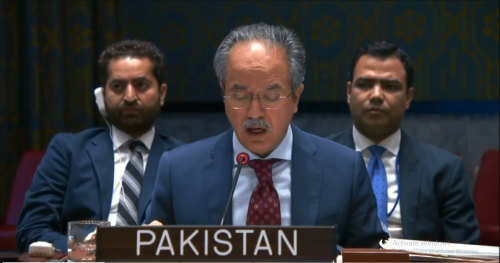ISLAMABAD: The International Monetary Fund (IMF) on Tuesday maintained Pakistan’s growth forecast at 3.5 per cent for the current fiscal year but indicated slower global disinflation to keep pressure on the masses amid higher for even longer interest rates.
The IMF’s unchanged growth forecast at 3.5pc previously made in April this year has been reinforced almost a week after its staff reached an agreement with Pakistan authorities on $7bn worth of a 37-month bailout based on detailed deliberations and exchange of financial and economic data including 2024-25 budget.
The government has set 3.6pc growth target for the current fiscal year.
In its World Economic Outlook Update 2024, the IMF noted that overall risks to the global outlook remained balanced, as reported in April, but some near-term risks had gained prominence with implications for emerging economies and oil-importing countries like Pakistan.
These include upside risks to inflation that stem from a lack of progress on services disinflation and price pressures emanating from renewed trade or geopolitical tensions.
Warns of persisting inflationary pressures
IMF staff projections are based on upward revisions to commodity prices, including a rise in non-fuel prices by 5pc in 2024. The fund expected the energy prices to fall by about 4.6pc in 2024, less than projected in April, “reflecting elevated oil prices from deep cuts by Opec+ (the Organisation of the Petroleum Exporting Countries, including Russia and other non-Opec oil exporters) and reduced, but still present, price pressure from the Middle East conflict”.
It said the monetary policy rates of major central banks were still expected to decline in the second half of 2024, with divergence in the pace of normalisation reflecting varied inflation circumstances. “The risk of elevated inflation has raised the prospects of higher-for-even-longer interest rates, which in turn increases external, fiscal, and financial risks”, the IMF said adding the prolonged dollar appreciation arising from rate disparities could disrupt capital flows and impede planned monetary policy easing, which could adversely impact growth.
“Persistently high interest rates could raise borrowing costs further and affect financial stability if fiscal improvements do not offset higher real rates amid lower potential growth”, the IMF.
Pakistan is among the top nations suffering from high borrowing needs and has higher interest rates amid low growth cycles. Almost all of government revenue earnings are consumed by debt servicing.
The report noted that policies that promote multilateralism and faster implementation of macro-structural reforms could boost supply gains, productivity, and growth, with positive spillovers worldwide.
Advice for central banks
Therefore, the IMF called for future-proofing the economy by persevering with restoring price stability and addressing the legacies of recent crises, including replenishing lost buffers and durably uplifting growth. In the near term, this will require careful calibration and sequencing of the policy mix.
It advised the central banks should to refrain from easing too early and remain open to further tightening should it become necessary. As the space for fiscal manoeuvre narrows, commitments to achieving fiscal consolidation targets should be earnestly adhered to, aided by sound fiscal frameworks and resource mobilization, the IMF suggested.
In emerging markets and developing economies, recent policy divergences highlight the need to manage the risks of currency and capital flow volatility. Given that economic fundamentals remain the main factor in dollar appreciation, the appropriate response is to allow the exchange rate to adjust, while using monetary policy to keep inflation close to target.
Foreign reserves should be used prudently and preserved to deal with potentially worse outflows in the future. To the extent possible, macro-prudential policies should mitigate vulnerabilities from large exposures to foreign-currency-denominated debt. Near-term challenges aside, policymakers must act now to revitalise declining medium-term growth prospects.
While emigration of the young and educated population can take a toll on source countries, the costs can be mitigated. Policies that help leverage diaspora networks, maximise the benefits from remittances, and expand domestic labour market opportunities are possible avenues.
Published in Dawn, July 17th, 2024















































